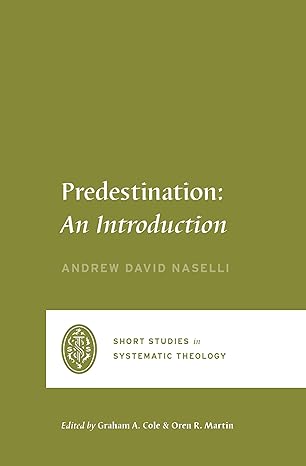A Brief Book Summary from Books At a Glance
by Steve West
Table of Contents
Introduction
PART 1: Vessels of Mercy
What Does the Bible Teach about Election?
1 What Is the Goal of Election?
2 When Did God Choose to Save Some Humans?
3 Did God Choose to Save Individuals?
4 Did God Choose to Save Individuals Based on Foreseen Faith?
5 Is Unconditional Election Unfair?
6 Do We Have Free Will?
7 Does Election Contradict God’s Desire That All Humans Be Saved?
8 How Does God Accomplish His Plan to Save Individuals?
9 How Do I Know If God Has Elected Me?
10 Did God Elect Babies Who Die?
PART 2: Vessels of Wrath
What Does the Bible Teach about Reprobation?
11 Who Ultimately Causes Reprobation?
12 How Does God Accomplish Reprobation?
13 What Is the Result of Reprobation?
14 What Is the Goal of Reprobation?
15 Who Deserves Blame for Reprobation?
Conclusion Exult in God as You Take in the View
Summary
Introduction
For some, studying issues of election and predestination can be intimidating or frightening, but it doesn’t have to be. We can have humble confidence that God has revealed himself clearly and that whatever he has revealed is good for us to know. We should approach this topic fairly and humbly, charitably and joyfully; we must avoid sinful pride and divisiveness. Like every doctrine, what God says about predestination is for his glory and our good. The Bible is filled with references to God’s elect and predestination. The Greek word that is translated as predestine means “to decide beforehand, predetermine.” In predestination, God predetermines that some will be elected for salvation, while nonelect sinners are justly passed over. Predestination, therefore, has two parts: God predetermines that some will be saved, and others will be condemned. Election is the positive part where God chooses to save individual sinners, and reprobation is the negative part where God justly chooses to pass over nonelect sinners so that they are punished as their sins deserve.
Sometimes, election and predestination function as synonyms, but the former emphasizes who God chooses and the latter emphasizes what he destines them for. In historical theology, treating election and reprobation as the two parts of predestination has been quite common. Calvinists and Arminians disagree on predestination because they have a fundamental difference in definition and understanding of God’s absolute sovereignty. The Calvinist acronym T.U.L.I.P. explains the logic of God’s sovereign grace in predestination and salvation. The doctrine of predestination is not a primary issue (i.e., being a Calvinist is not necessary to be a Christian), but it is a secondary doctrine (i.e., it is important for the vitality and health of the church).
Part One: Vessels of Mercy
What Does the Bible Teach about Election?
The greatest danger we face is eternal punishment because of our sin and rebellion against God. The greatest salvation we can ever experience is salvation from our sins. Election is God’s sovereign and gracious choice to save individuals. Although there are numerous things that God is doing in election that he hasn’t revealed, he has disclosed some of his goals to us. One goal is to save us so that when we are judged we are given eternal life rather than punished with eternal death. We are elected to be morally pure, holy, and blameless in God’s sight. We are predestined to be conformed to the image of Jesus Christ, God’s Son; this includes moral conformity and also a glorified, resurrected body like his. We are elected to sonship, adopted as God’s heirs. We are predestined for works of obedience and cleansing in Christ’s blood. One beautiful goal of election is to bring us to Jesus, so that we may live forever with him, seeing him in glory. Biblical election destroys any foundation for our pride, bringing low the proud and lifting up the humble—in fact, the doctrine of election itself serves to humble us. Election to salvation magnifies the incredible, marvelous, sovereign grace of God. It is not to our credit, but all to the praise of his glorious grace. All of these goals have practical implications for how we live our lives, and they lead us to prayer and to praise. . . .
[To continue reading this summary, please see below....]The remainder of this article is premium content. Become a member to continue reading.
Already have an account? Sign In
Buy the books

PREDESTINATION: AN INTRODUCTION, by Andrew David Naselli